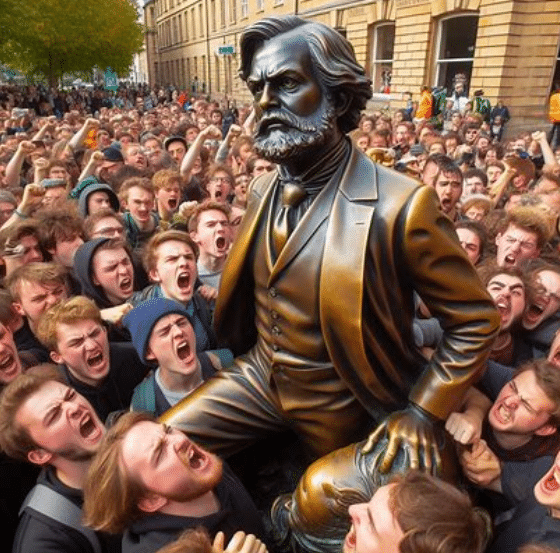Imperial Measurement: am I biased?
SUGGESTED



The most recent revival of the Williams Thesis occurred doing the BLM-mania that broke out in 2020, so for obvious reasons, it was never going to be a dispassionate cost-benefit-analysis of slavery and colonialism. It was always going to be a woke morality tale. Even if I were a left-wing historian who is sympathetic to the Williams Thesis in principle, I would be wary of reviving it in this particular context.
BLM-mania is arguably just another branch of Millennial Socialism, which is why the movement had a very explicitly anti-capitalist character right from the start. Again, in this context, a revival of the Williams Thesis was never going to be a dispassionate cost-benefit-analysis. It was always going to be just another stick to beat capitalism with.
The current version of the Williams Thesis is popular, because it fits neatly into our woke anti-capitalist zeitgeist. It serves as a dual-purpose original sin story: an original sin story of capitalism, and an original sin story of the Western world. Thus, it allows its proponents to flaunt their anti-capitalist credentials and their woke credentials at the same time.
It is, however, important to interrogate one’s own potential biases when writing a book of this nature. I accuse my opponents of being driven by anti-capitalist and anti-Western resentment. But could this accusation not easily be turned around, and thrown right back at me? If my opponents are biased because they have it in for capitalism, could I not be equally biased by a desire to hold capitalism blameless? Do I not have an ideological preference for presenting capitalism as a benign system of peaceful, voluntary exchange? Would acknowledging a central role for colonialism and slavery not go against that narrative?
As an initial knee-jerk response – perhaps. But in thinking about the issue more systematically, I honestly don’t think there is anything resembling a symmetry between the pro-capitalist and the anti-capitalist bias. The people who defend capitalism today do not generally do so because they think capitalism has an unblemished history. They generally do not think about the history of capitalism very much at all. (And if you are an anti-capitalist, you may think that that is part of the problem.)
Believing that capitalism is the best economic system available today, and believing that capitalism has been a force for good right from the beginning, are two very different things. You do not need to believe the latter in order to believe the former.
When I first started to question my infantile teenage socialism, and to develop a grudging appreciation of the market economy, I did not do so because I thought of capitalism as a system with an unproblematic history. On the contrary: I still subscribed to a heavily social democratic understanding of the history of capitalism. I believed that early capitalism really had been a dreadful system of exploitation and mass immiseration, and that the early Marxists had been spot on in their critique of the kind of capitalism they observed, in their day and age.
But I also believed that capitalism was not like that anymore. I believed that in the meantime, we had found ways to civilise it. By complementing capitalism with a welfare state, consumer protection, workers’ rights, and universally accessible public services, we had taken the rough edges off it. If anything, I thought, we had probably gone too far in making capitalism cushy and cuddly, thereby undermining incentives, and stifling its dynamism.
To be clear, I no longer believe in that social democratic interpretation of capitalism’s history today. But the point is that that view was neither uncommon at the time, nor is it inconsistent. You can believe that modern capitalism is a force for good, even if you believe that it has not always been. You would then see capitalism as a reformed criminal, a former juvenile delinquent who has since been successfully rehabilitated.
I believe in capitalism. I think it’s the best system we’ve got today, and the best system we will have for the foreseeable future. I want more people to believe the same. And I find it troubling that among Millennials and Zoomers, very few do.
But I have no burning desire to convince people that capitalism has a brilliant origin story. Even if it turned out that the original sin story of capitalism was correct, for me, it would still not automatically follow that we should overthrow capitalism today. (And besides, if you think that capitalism is forever discredited by its original sin, would you not have to apply the same standard to socialist alternatives too?)
We are all ideologically biased when it comes to issues that we see as foundational to our worldview. But this is just not one of those issues. You can, in principle, believe in a version of the Williams Thesis, and still be a supporter of capitalism.
So I honestly do not think that it is just motivated reasoning which has led me to the conclusions that I reach in Imperial Measurement. I simply lack the motivation to do the motivated reasoning. I believe that these are conclusions which a centre-left historian could – if a little more grudgingly and with differences in tone – also have reached – unless, of course, their goal is to attract applause and in-group approval on Twitter.




